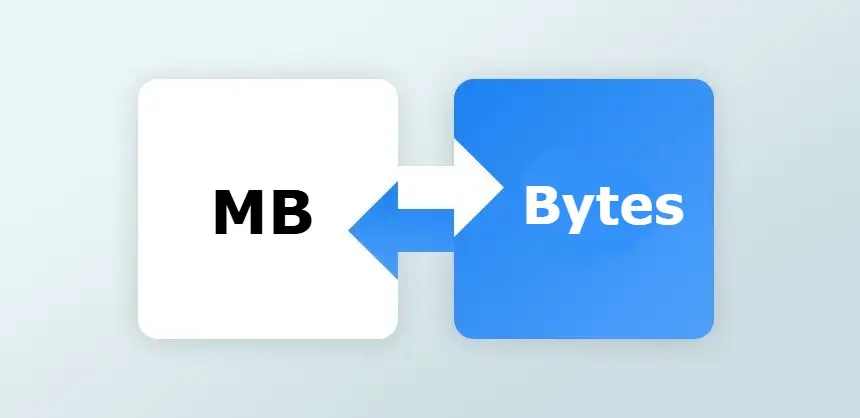MB to Bytes Converter - Convert Megabytes to Bytes & Other Units
Convert between megabytes, bytes, and other digital storage units. Understand data at the byte level with memory structures, computational context, and real-world examples.
Enter the number of megabytes to convert
Conversion Results
Enter megabytes value and select conversion type to see results
Related & Other Popular Converters
Our free and reliable Megabytes to Bytes Converter makes it quick and easy to convert Megabytes into Bytes. Whether you are working with memory, storage, or data transfer, knowing the quantity of bytes in any megabyte allows your calculations in computers, file handling, and development to be precise.

What MB to Bytes Conversion Means
The MB to Bytes converter can tell you how many Bytes comprise a Megabyte.
In digital systems, a Megabyte (MB) equals 1,048,576 Bytes (B) (the binary system known as base 2), which is typically used in computer memory architecture.
However, in some contexts like data storage devices (base 10), 1 MB = 1,000,000 Bytes.
Our MB to Bytes converter supports you in making calculations using both binary systems and decimal systems, concerning the relevant standards of a Megabyte's value in Bytes.
How to use the MB to Bytes Converter
Using our Megabytes to Bytes converter is quick and straightforward:
It's perfect for developers, students, and professionals who deal with file size calculations, memory allocation, or network data measurements.
Formula to Convert MB to Bytes
To convert MB to Bytes, use these formulas:
Binary (Base 2):
Bytes = MB x 1,048,576
Decimal (Base 10):
Bytes = MB x 1,000,000
Example:
If you have 5 MB, then in binary terms:
5 x 1,048,576 = 5,242,880 Bytes
Our MB to Bytes converter automatically handles these calculations for you in a single click.
Why use our MB to Bytes Converter?
Whether you're a software engineer, data analyst, or student, our Megabytes to Bytes converter ensures precision and convenience.
MB to Bytes Conversion Table
| Megabytes (MB) | Bytes (B) - Decimal | Bytes (B) - Binary |
|---|---|---|
| 1 MB | 1,000,000 Bytes | 1,048,576 Bytes |
| 5 MB | 5,000,000 Bytes | 5,242,880 Bytes |
| 10 MB | 10,000,000 Bytes | 10,485,760 Bytes |
| 100 MB | 100,000,000 Bytes | 104,857,600 Bytes |
| 1024 MB (1 GB) | 1,024,000,000 Bytes | 1,073,741,824 Bytes |
Common uses of MB to Bytes Conversion
In each of these examples, it is good to utilize an MB to Bytes calculator to ensure all of your calculations are accurate.
The MB to Bytes calculator is a handy tool for the instant conversion of Megabytes to Bytes accurately.
Whether you are looking at digital files, cloud storage, or writing a program, the accurate conversion of units helps to avoid any miscalculations.
Please use our Megabytes to Bytes conversion today to make your data calculations easier and make more sense of this by making every byte matter.
FAQs
In binary, 1 MB = 1,048,576 Bytes. In decimal, 1 MB = 1,000,000 Bytes.
There are two different values as binary (base 2) measurements differ from decimal (base 10) measurements. Computers do use binary while manufacturers tend to use decimal.
You would take the MB value and multiply by 1,048,576 (binary) or 1,000,000 (decimal).
Yes, developers use Megabytes to Bytes conversion in the application when determining file storage, cache limits, and memory optimization for the system.
Absolutely - just divide across by 1,048,576 (binary) or 1,000,000 (decimal) and you will find MB.
MB (megabyte) work to a decimal system where it would be 1,000,000 Bytes. MiB (mebibyte ) works to a binary system where it would be 1,048,576 Bytes.